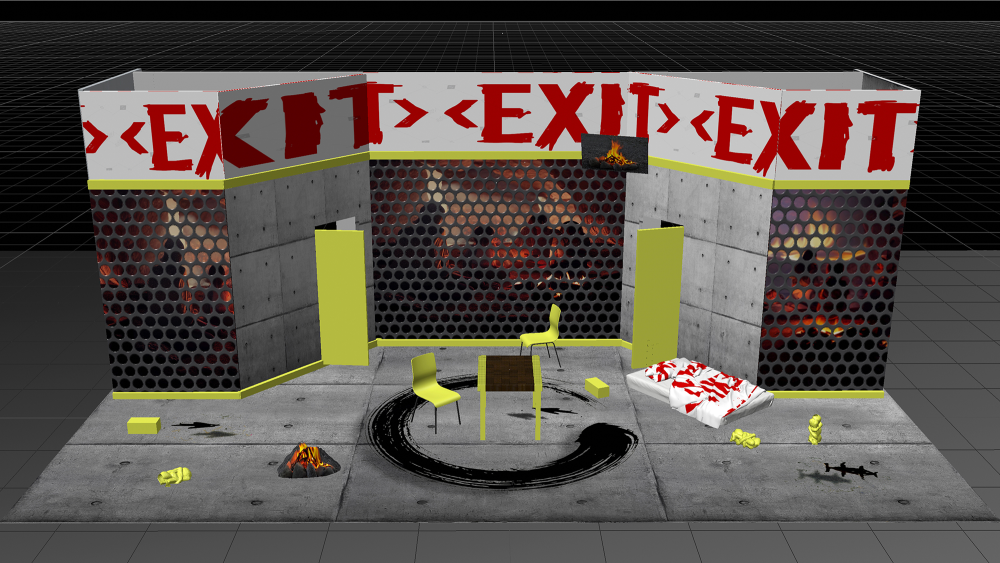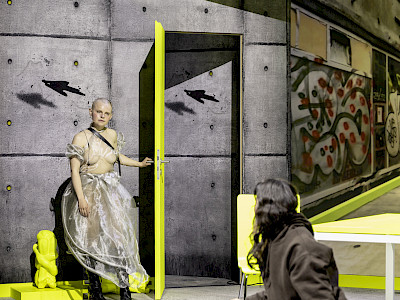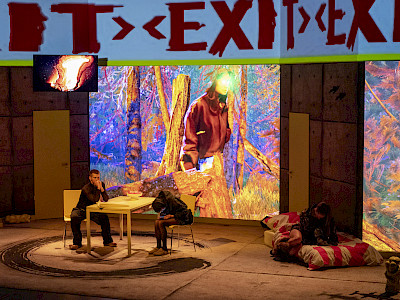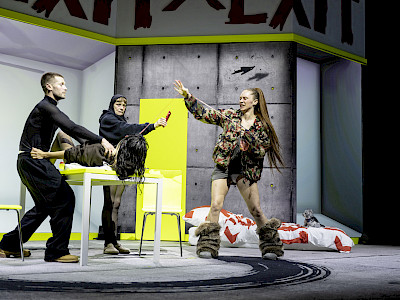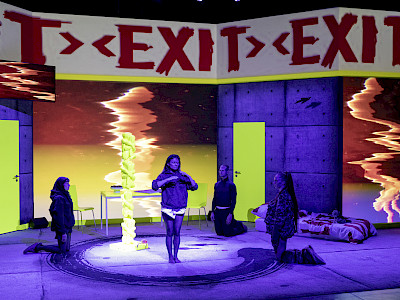11 — 13.05.2023
Susanne Kennedy, Markus Selg Berlin
ANGELA (a strange loop)
theatre — premiere
| English → FR, NL | ⧖ ±1h30 | €21 / €17 | Contains stroboscopes
In ANGELA (a strange loop), a woman's life unfolds before our eyes in a space that constantly transforms, switching between real and virtual as we follow Angela through waking and sleeping, being born and giving birth, sickness and healing, ageing and dying. But what makes Angela Angela? With her trademark post-humanist aesthetic and multimedia approach, celebrated German theatre-maker Susanne Kennedy collaborates with visual artist Markus Selg to delve into one of the fundamental questions of existence: what is the nature of reality and what am ‘I’? The actors uncannily approximate a perfect but artificial reality. They speak in lip-sync and slightly out of rhythm, as if trying to imitate real life. Digital culture and virtual reality mix seamlessly with spirituality and philosophy. Susanne Kennedy is one of today’s most innovative theatre-makers and was awarded the European Theatre Prize. With this creation, presenting her work in Brussels for the first time, she serves up a case study of what it means to be a human being. An intense visual trip and a brand new way of experiencing theatre.
Interview with Susanne Kennedy
ANGELA (a strange loop) isn’t your first project to feature a female protagonist.
There is indeed a connection to my other plays, especially the previous one, Jessica, an incarnation, which I created at the Berlin Volksbühne in February 2022. They’re part of a series which seems to have begun with Women in trouble in 2018. ANGELA (a strange loop) focuses on a female character and invites the audience to a sensory, visual, and phenomenological experience. With ANGELA, I explore the question of transformation. Can we look at a life under the microscope? While Jessica as a character was a rather prophetic figure, Angela is trapped in her routine. She’s a rather normal woman, though she suffers from an illness which isn’t specifically named. I was struck by the fact that after the pandemic, most people suffering from long Covid were women… The body seems to be attacking itself, like with an auto-immune disease. With long Covid, the body keeps reacting long after the disease is gone. To build the play, I didn’t rely on scientific research, and I didn’t want to talk about the effects of Covid, but it’s a question that struck me, and I saw connections there. Angela’s illness is more like a fever, it remains pretty vague. We enter a metaphysical dream haunted by a number of questions. What does it mean to be alive? To suffer? The character seems to reach a crucial and unavoidable moment in her life where her body says “no” and has to take leave from itself. We are witness to a disappearance, without knowing where Angela’s gone. When she returns, she tells us of a parallel world, a sort of death, a visit to the underworld, outside of the world. There’s something of the fantastic, of the supernatural about it. I like to flirt with the aesthetics of science-fiction, where one place can contain several layers of meaning. We shift from reality to the supernatural, we live in a world, then in another. Dream? Reality? Parallel worlds where one event can be experienced by different people, and thus played by different actors. I’m fascinated by this kind of sensory confusion, which challenges our conception of reality; it’s often the starting point of a mythology. We need stories to explain the real, especially what remains difficult to explain.
Could you describe your writing and directing process when creating those worlds between the real and the surreal?
The writing process is pretty long. I write down ideas, fragments of dialogue overheard on the street or in YouTube videos or read in a newspaper. I gather those different references in a file, much like a patchwork. I don’t sit down at a table in front of a blank page because the writing of a play is an integral part of my everyday routine, of the situations I experience. The language is pretty generic. I like to use platitudes or banal and unspecific turns of phrases. I may have heard them in a TV show, or in a conversation about the weather. We never really know what the characters of the play think or feel. It creates a feeling of strangeness, because we expect this veneer of propriety to break at any moment. I wanted the spectators to see Angela’s bedroom, as we discover her in her daily life as a YouTube influencer who posts about her illness on social media. The play opens the way a TV show would, with a series of scenes, very simple scenes from her daily life all set in her bedroom, before it starts to slide into a different reality, into strangeness. The text revolves around five characters: Angela and three close relations, her mother, her boyfriend, and a close friend. The fifth character is a liminal figure, a sort of silhouette who accompanies her in her passage towards the weird, towards this underworld, this hell, if we are to use a word that’ll mean something to everyone. The scenography uses video projection a lot. The white walls of her inner space transform as the story unfolds thanks to images projected to accompany the reality of her daily life, which then take part in that passage towards a “supernatural” space. The sound design also plays an important part in leading us towards the strange. All the dialogues have been pre-recorded in a studio and are then broadcast again; none of the actors speak directly. It implies a very precise and technical lip-synching performance on their part. There is no diegetic sound, nothing comes from the stage. It takes on the aspect of a perfect pantomime, it creates a subtle gap between what’s true and what’s false within reality itself.
In your creative process, you use many different technologies to examine our perception of the real.
I work with multimedia artist Markus Selg and a faith-ful team of artists, including sound designer Richard Janssen. Together with Videoartist Rodrik Biersteker, we often explore very technological forms. In one of our previous shows, based entirely on virtual reality, every spectator wore a headset. It’s a creative process we’re used to exploring. All reality, to us, is virtual… Antonin Artaud said so himself, with the idea that theatre is a place that recreates, that simulates the real and manipulates our perceptions. It allows us to challenge this reality we often take for granted and rarely question. I always try to challenge our perception of things, in order to unsettle our judgment and question our certainties. That’s how you create a tiny sensation of hollowness or emptiness. In the gap between the bodies of the actors and the pre-recorded voices, the words suit the characters’ gestures, but they don’t fit perfectly. There’s a tiny slowing down between the two, it disrupts our understanding and perception of an action. I’m interested in this misalignment. The movement of the bodies becomes a sort of game, the relationship to speech starts to seem like a manipulation of space and time, as if we were hypnotised, or feverish. It’s also the state of our protagonist Angela. Moreover, Angela’s bedroom has a door on each side. We can play with entrances and exits. Entering a space always leaves a mark, and exiting it can erase that mark or transform it. The set, in addition to being Angela’s bedroom, could also be the set of a reality TV episode or of a movie. There’s something very common about that space. At once personalised and impersonal. Are we seeing the daily life, the reality of the character? Or a staged version of her reality?
As for the other reality Angela will experience, it’s inspired by dreams, by your fascination for science-fiction worlds. But you also mentioned mythology…
While ANGELA isn’t based on any particular myth, I like the idea of mythology. I’m fascinated by the faculty humanity has of explaining and recreating the world through stories about imaginary, foundational facts. I spent a lot of time studying Carl Gustav Jung’s writings about transformation and individuation, that is, the capacity for one individual to become distinct from other individuals of the same species, the same group, even the same society. I also like to explore the idea according to which we have to delve into the dark, into the darkness in more mythological terms, and face our demons in order to transform and save ourselves. Those questions can be found in all great myths. There are so many stories of painful and dangerous journeys which end with the protagonist undergoing a transformation. ANGELA, of course, doesn’t have the scale of an Odyssey, but I like the idea that she’s a woman, with a very quotidian, very ordinary story, and the way this simplicity disintegrates to slide into a more complex and subterranean reality. Things happen around her more than she causes them to happen. Angela remains a mystery, we don’t really know what she thinks or feels. She’s relatively passive, like a blank screen onto which we can project our own desires.
Interview conducted by Moïra Dalant for Festival d’Avignon 2023
Presentation: Kunstenfestivaldesarts, Théâtre National Wallonie-Bruxelles
Concept, text and direction: Susanne Kennedy | Concept and stage design: Markus Selg | Performers: Diamanda La Berge Dramm, Ixchel Mendoza Hernández, Kate Strong, Tarren Johnson, Dominic Santia | Voices: Diamanda La Berge Dramm, Cathal Sheerin, Kate Strong, Rita Kahn Chen, Rubina Schuth, Tarren Johnson, Susanne Kennedy, Ethan Braun, Dominic Santia, Ixchel Mendoza Hernández, Marie Schleef, Ruth Rosenfeld | Sound design and montage: Richard Alexander | Soundtrack: Diamanda La Berge Dramm and Richard Alexander | Live music: Diamanda La Berge Dramm | Video design: Rodrik Biersteker, Markus Selg | Costume design: Andra Dumitrascu | Dramaturgy: Helena Eckert | Light design: Rainer Casper | Sound operator: Max Heesen | Video operator: Stefan Korsinsky | Light operator: Sebastian Zamponi | Artistic collaboration and Touring Director: Friederike Kötter | Stage assistant: Lili Süper | Artistic costume assistant: Anastasia Pilepchuk, Anna Jannicke | Directors intern: Tobias Klett
Many thanks to Nick Drnaso and David OReilly for inspiration and quotes
Production: Ultraworld Productions | Management: Something Great | Artistic production manager: Philip Decker | Technical production manager: Sven Nichterlein | International distribution: Rui Silveira – Something Great | Stage Construction: Stefan Pilger | Tour manager: Niki Fischer – Something Great
Coproduction: Kunstenfestivaldesarts, Wiener Festwochen, Festival d’Automne à Paris & Odéon-Théâtre de l’Europe, Festival d’Avignon, Holland Festival, National Theatre Drama / Prague Crossroads Festival, Romaeuropa Festival, Teatro Nacional de São João, Volksbühne Am Rosa Luxemburg Platz
Supported by the Ammodo Foundation and the German Federal Cultural Foundation with funding by the German Federal Government Commissioner for Culture and the Media
Performances in Brussels with the support of the Goethe-Institut Brussels
